When you ask someone to imagine a gay man, images from TV and in movies have provided a pretty rigid stereotype: extremely appearance- and fashion-conscious, slender and gym-going, flamboyant, probably under 35 with an “artistic” or at least a white-collar job.
Now cast your eyes around a recent Sunday afternoon meeting of the Fort Worth gay men’s group known as the Trinity River Bears, and notice: Nobody here fits that type.
The TRB officers and members sitting on the back patio of the Club Reflections gay bar are all over 45. The fashion look of choice is t-shirts, old jeans, and worn boots or sneakers. Nobody seems particularly ashamed of his paunch or wrinkles. An abundance of facial hair, much of it gray, covers cheeks and jowls. With all the laughter and joking at this table, these men seem utterly comfortable in their own skins. Don’t tell them that being gay requires a certain amount of hair gel, body waxing, or a strict daily workout routine to keep their abs in shape.
The Trinity River Bears are the city’s representatives of bear culture, a subgroup within the LGBT community that not only accepts but celebrates larger and hairier body types, ultra-casual dress, a more advanced age, and a diversity of professional backgrounds and personal experiences that stretch far beyond the urban gay ghetto. Bear culture has its own social events and lingo –– younger bears are often referred to as “cubs,” older bears as “polar bears,” and skinny bears as “otters.” That said, many self-identified bears are too laissez-faire to strictly enforce anybody’s rules, including their own.
Mainstream culture has been catching onto bears in recent years, with bear characters appearing regularly on popular sitcoms like Modern Family, Happy Endings, and 2 Broke Girls. The youthful, clean-cut, well-dressed gay neighbor now has some competition –– the hairy, chunky, often slovenly and somewhat more masculine bear. But don’t tell the Trinity River group that it’s suddenly hip to be bear: They’ve been doing the laid-back bear thing since 1997, hosting potlucks, campouts, and charity events for the LGBT and HIV/AIDS community in general and, as their website states, “big, hairy gay and bisexual men and their admirers” in particular.
“It’s a comfortable place for those of us who don’t want to be or never will be Calvin Klein model types,” said Bob Whittaker, the treasurer and secretary of TRB. “We’re from all walks of life, including ex-jocks and the guy next door. The only standard is that there’s not really a standard.”
********
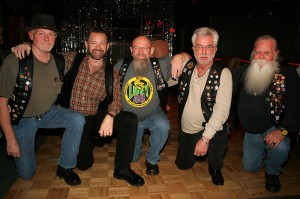
Unsurprisingly, bear culture in the national LGBT community originated with a bar in San Francisco. Opening in 1989, the Lone Star Saloon was nicknamed “Bear Bar U.S.A.” for its preponderance of chubby, hairy body types and ultra-casual dress. Although ageism and appearance bias are everywhere in American society, the gay male community can be particularly harsh in its glorification of youth and beauty. Bear culture, in reaction, celebrates a more natural, traditionally masculine type.
In the 1990s, as gay men across the country were longing to let their hair down and their waistlines expand a little, bear culture was spreading across major cities via the internet. The Trinity River Bears was started in the mid-’90s by a couple named Jimmy Holliman and Larry Perry. Larry was a big hairy dude; Jimmy was an admirer of the type. Their meetings began as monthly dinner outings for like-minded individuals, then became a community organization in 1997.
Both Larry and Jimmy have since died. In the last 16 years, as many as 65 people at a time have been casual members, though the active, dues-paying membership has stayed steady at around 25. Many of the current core members have been in TRB for years and have similar backgrounds: not a lot of experience with the traditional gay bar scene, either because they were involved in long-term monogamous relationships or because they didn’t come out of the closet until later in life.
TRB vice president Brian Epperson, 55, is an army veteran currently on disability. He was married for 28 years to a woman who knew that he was gay, though for much of that time their relationship was “don’t ask, don’t tell.” She died in 2005 after a long-term illness, and Brian, who helped care for her until the end, came out after that as a middle-age man into the Fort Worth bar scene. He found himself standing alone in a lot of corners, not talking. He also didn’t care much for the dance remix/neo-disco music played at a lot of gay clubs. He met one of the founding TRB members at a bar and joined the group in 2005.
“A lot of people don’t like to go to the Rainbow Lounge,” he said of the popular Fort Worth nightspot. “It’s because of the average age [of the patrons] and their music and style of dance. They have younger types there, twentysomethings. But I was always into older men. I had bear tastes before I knew what bear culture was.”
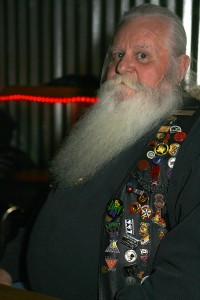
TRB member Jim Stevenson of Arlington retired from Texas Instruments in his 50s and has been an antiques dealer ever since. At 71, with a paunch and a full, long gray-white beard, he’s in demand for two kinds of appearances: as a professional Santa Claus doing seasonal work at private parties and events and as a model for bear erotica. Adult media companies have flown him to various U.S. cities to do nude photo shoots, though he’s never filmed any sex scenes. Too many drugs and too much shadiness in the porn business, he said.
As far as a lot of mainstream gay bars and social events, “I’m not the belle of the ball at your typical cocktail party,” he said. He was in a monogamous relationship with another man for almost three decades, he said, and “We didn’t even know where the bars were located.”
When he and his partner split, Stevenson joined the Dallas Bears and later the Trinity River group. His stocky build and long white beard made him an instant hit at social events. Indeed, in 2001 he won the Mr. Polar Bear contest at the Texas Bear Round Up. Sponsored by the Dallas Bears each March, the Round Up attracts upwards of 2,000 participants from around the world. It’s the country’s largest bear social event. (Full disclosure: I was active with the Dallas Bears for about a year and volunteered at the 2012 Round Up.)
TRB treasurer and secretary Whittaker, a retired 72-year-old computer technician who lives in Richland Hills, had been a member of gay leather/S&M clubs over the years before he joined the Trinity River Bears in 2000. The leather scene has its own, sometimes strictly enforced, dress and codes. Whittaker gravitated to TRB because he liked the unpretentious, friendly attitude of the members.
As a computer expert, he has watched with interest as the internet supplanted bar culture in the LGBT community, chiefly by facilitating the spread of niche groups like the bears. Through connections made via the web, people have been creating their own social groups based on mutual interests, rather than gathering at local watering holes that feel safe and familiar but might not offer music, vibe, or clientele that matched individual tastes.
“It’s been an interesting transition, watching the bars lose some of their impetus [to the internet and social media],” he said. A group like TRB is “not terribly formal in terms of having strict rules and regulations. It’s a more casual atmosphere. ‘Bear’ is a state of mind as much as it is anything.”
********
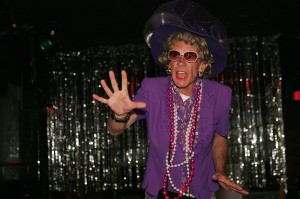
Like many LGBT organizations, Trinity River Bears are active in charity work. One of the group’s main charities is a series of annual campouts for persons living with HIV/AIDS and their loved ones, held on a 30-acre campground in Milam County, south of Waco. The grounds are owned by the Texas Conference of Clubs, a loose network of LGBT social and service organizations from around the state. TRB members, some of whom are HIV-positive, help with everything from food preparation to registration and carpooling.
Ray Moore, a Trinity River Bear member and a regular campout volunteer, described the experience of the campouts: “We use cabins [on the TCC grounds] with heat and air-conditioning. That’s our idea of roughing it.”
The charity closest to the bears’ hearts, though, is the monthly Wall of Food benefit show at a local gay bar called Club Changes. Wall of Food collects cash, canned goods, and other non-perishable food items for the AIDS Outreach Center, the Tarrant County HIV/AIDS service organization that has experienced significant cuts in state and federal funding over the years. After more than 24 years in operation, the benefit show that features local amateur and professional drag performers is finally about to receive its federal nonprofit status so that donations by individuals and corporations will be tax-deductible. Through the years, the shows have raised about $575,000 for the AOC food pantry.
The benefit show is hosted by veteran HIV/AIDS activist Rhonda Mae Cox, herself the subject of a Fort Worth Weekly cover story in 2008. The Trinity River Bears have sponsored the third Wednesday Wall of Food show for more than two years; TRB member Moore is responsible for booking the performers. Moore himself performs at many of the shows as his drag alter ego Rayleana Onatable, a name that has its source in a bawdy anecdote from one of the Bears’ TCC campouts.
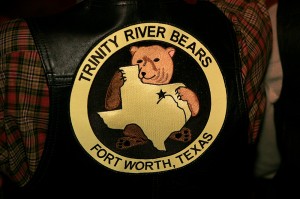
Cox is not a TRB member but has been friends with many of the bears for a long time. She said their help with Wall of Food has been incalculable.
“I’m 66, and I don’t have as much energy as I used to,” she said with a chuckle. “The bears are a rather small group, but they’re very dedicated to whatever they do. They line up the entertainers [for the third Wednesday show], so basically all I have to do is show up. It takes a lot of pressure off me.”
********
Besides their regular monthly schedule of brunches, membership meetings, and Wall of Food charity shows, the Trinity River Bears are preparing for a big annual event: Feast Camp Out in November, a weekend of food and outdoor activities at the TCC’s Milam County property. This year’s theme is great meals from the era of luxury passenger trains.
While the bears pride themselves on their informality at most events, they turn fancy for the Feast: Past menus have included baked French toast, chateaubriand, and homemade soups served — despite the rustic setting — on fine china and silverware.
Bears may be more visible these days, from mainstream TV to gay indie flicks like Bear City and web-only series like Where the Bears Are. But for the Trinity River Bears, their mantra stays the same: providing a comfortable social space for gay men of all ages, body types, social classes, and professional backgrounds.
Whittaker admitted that bias about age and appearance can be real problems in some pockets of the LGBT community. But he thinks that gay men’s reputation for being snobs where looks and income are concerned has always been overblown.
“You see the same kinds of prejudice in all walks of life,” said Whittaker. “Some people [in the gay male community] are like, ‘Oh my god, you’re over 30? Are you ready for your coffin?’ At the same time, as I’ve gotten older, I’ve observed that many older people think nobody under 30 has a brain. Neither one is true.”
Stevenson, the adult model and seasonal Santa Claus, put bear culture into perspective this way: “Everybody wants to be accepted,” he said. “With a group like Trinity River Bears, people are not ashamed to be bubbas. In bear culture, you don’t have to be something you’re not, to get what you want.”



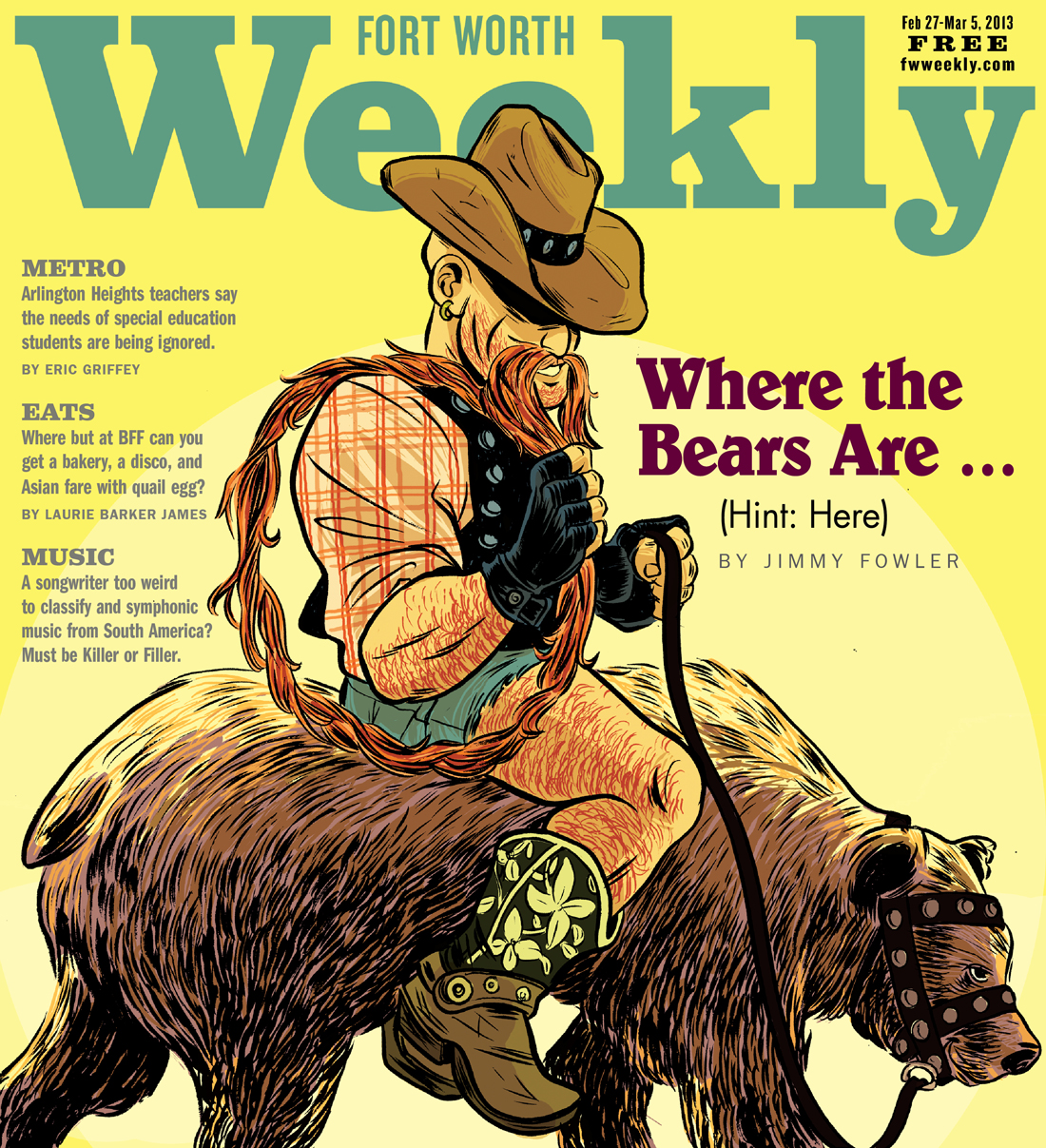
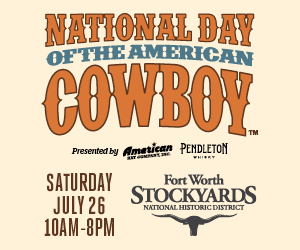








We were members of the Bears for years until we became full time campers and are not often in the metroplex area. A fun group and the friendliest club one can find. We were friends with Larry Perry for over twenty years and spent countless hours making the TRB a really fine club. We miss him daily. PS And when we are in the area, the Bears make us feel totally welcome to attend their functions. This is a very true and factual description of this friendly club.